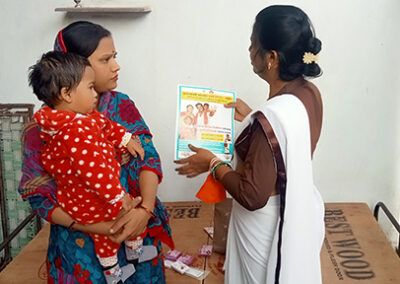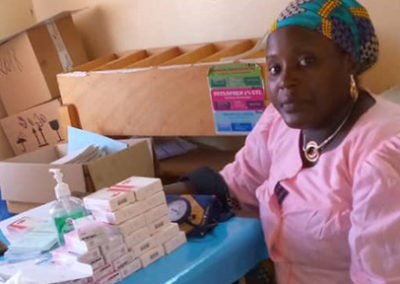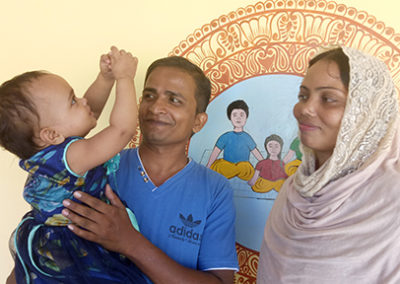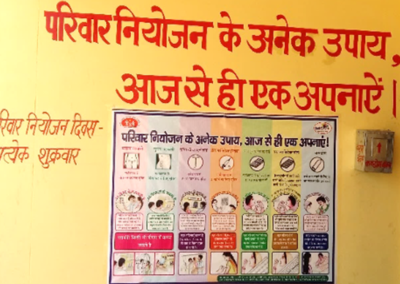TCI Global Toolkit: Service Delivery
Designated Day for Assured Family Planning Service Provision- Home
- Help and Support
- Close
- Toolkits
- Global Toolkit
- AYSRH Toolkit
- Hub Toolkits
- Core High-Impact Practices
- Gender Essentials Mini Course
- Close
- Resource Collection
- Community of Practice
- Coaching
- Log In/Register
- My Profile
- English
What Is It?
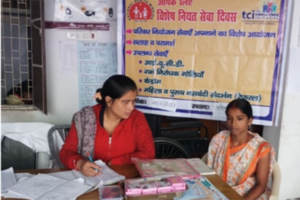 Designating a day for assured family planning service provision is when services are provided at a fixed facility, on a designated day – often for free. The special days can offer a specific contraceptive method or a full range of methods (see examples from India, Senegal, Kenya and Nigeria in the boxes below).
Designating a day for assured family planning service provision is when services are provided at a fixed facility, on a designated day – often for free. The special days can offer a specific contraceptive method or a full range of methods (see examples from India, Senegal, Kenya and Nigeria in the boxes below).
The special days can complement routine family planning service provision by offering a method that is typically not provided at the facility, or by guaranteeing availability of a routine family planning service on a specific day.
It is accompanied by community mobilization to raise awareness of these days so the community can expect to receive family planning services at the particular location and time.
What Are the Benefits?
- Facilities can galvanize their quality improvement efforts around a specific day, service and time.
- Individuals are guaranteed to receive the family planning services they come for after screening for medical eligibility.
- Clients’ waiting time is minimal.
- Clients may appreciate a schedule of specific services, for example, that intrauterine devices (IUDs) are offered on the third Thursday of every month, to help them plan in advance when to get the specific method they want. The scheduled days also allows for trained LARC providers to provide supportive supervision and on-the-job training support to newly trained providers, thus extending the pool of LARC providers in a given area. In addition, the scheduled days assures clients that they are guaranteed to get the specific service they want that day.
- As facilities demonstrate reliability of service delivery on the special days, clients’ confidence in the facilities and providers improves, in turn improving their chances of returning for other services.
- Geographic and financial access to family planning for underserved populations increases. In Francophone West Africa, family planning services were often combined with other services such as breast and cervical cancer screenings, infertility care, and HIV/AIDS care, further serving the health needs of underserved populations. The same has been the case in Nigeria.
India
In India, the government endorses the fixed-day service provision approach – which it calls the Fixed-Day Static (FDS) approach – to provide quality intrauterine device, no-scalpel vasectomy and female sterilization services. The FDS approach is a component of the national family planning guidelines, and all health facilities are required to conduct FDS.
In some sites, this approach was so successful that every day became an FDS day where particular methods were made available on specific days to ensure community members could plan ahead to obtain their desired method.
Senegal
Senegal refers to the designated service provision approach as Special Free Family Planning Days, in which the full spectrum of contraceptive methods is offered to individuals free of charge.
These days are held in existing health facilities or in other sites close to underserved populations, either in a mobile clinic or in government buildings. Community health workers conduct household visits to inform the community about upcoming special days. Each special day serves, on average, about 30 new contraceptive acceptors, based on 6-month implementation data from two districts.
East Africa
In East Africa, designated service provision days are referred to as In-reaches and utilize a trained team of service providers from the facility to provide family planning services to clients with a focus on long-acting and permanent methods (LAPMs).
In Tanzania, in-reach teams also visit facilities that lack capacity to support service delivery. In addition, the team provides mentorship to the facility-based providers, building their capacity to provide long-acting permanent methods routinely.
Nigeria
Similar to East Africa, designated service provision days are referred to as in-reaches and are leveraged to build the capacity of more providers in the provision of long-acting reversible contraceptives (LARCs). In-reaches describe the provision of family planning services to clients mobilized from the community to a particular facility, usually a primary health center (PHC) on designated days of the week. The facility providers where in-reaches occur work closely with community social mobilizers to synchronize mobilization days to clinic days for seamless service provision. TCI supports governments to use trained and outsourced service providers in the provision of FP services across identified in-reach health facilities.
Similar to Senegal and Francophone West Africa, other Reproductive, Maternal, Newborn, Child and Adolescent Health (RMNCAH) services, such as cervical cancer screening, antenatal care, immunization services, are often integrated with family planning service delivery at an in-reach in Nigeria and are attractive to clients because family planning consumables are often free during an in-reach.
How to Implement
Select a date
- Doctor
- Anesthetist (if available and necessary, for example, to provide female sterilization)
- Paramedical staff
- Lab technician
- Counselor
- Ward boy
- Sweeper
If the fixed-service day for a particular facility is part of a longer series of fixed-service days or if a group of facilities are conducting fixed-service days, prepare a consolidated schedule that shows all facilities’ planned service days. This calendar example from India shows on what day of the week that 11 facilities in Aligarh district plan to offer fixed family planning service days. Once the dates are fixed, the calendar should be widely circulated among facility staff.
Prepare the facility
Recruit and prepare a list of available medical and non-medical staff who will be implicated in the service day. In places where a facility does not have appropriately trained medical/paramedical staff to assist with provision of the family planning services, qualified staff from another facility should be recruited for that day. Ensure availability of commodities and supplies; this includes both contraceptive stock as well as medical equipment and other consumables. Make sure you have infection prevention supplies available as well. You can develop or adapt a checklist from India to make sure the facility is ready for the service day.
Engage the community
Provide quality services on the fixed day
The client should be offered the method of choice unless the client is not medically eligible for that method. In that case, the provider should offer appropriate counseling to help the client choose another suitable method. The client should receive any post-procedure counseling, if appropriate, such as counseling about possible side effects and early warning signs that require medical attention and scheduling any necessary follow-up appointments.
Monitor progress
- Number of fixed days planned compared with number of fixed days held
- Number of new family planning acceptors recruited through such days
- Number of women who switch from short-acting methods to long-acting reversible contraceptives or permanent methods
- Number of women continuing family planning methods due to these special days
- Total number of women benefiting from family planning services at these special days
- Number of family planning clients served through fixed-day services, by method mix distribution
- Percentage of family planning clients served through fixed-day services to the total family planning clients served, by method and/or by month
What Is the Evidence?
India
The Challenge Initiative for Healthy Cities (TCIHC) worked along with the state government of Uttar Pradesh, Madhya Pradesh and Odisha to prioritize weekly fixed-day service provision for both short-acting and long-acting methods (LARC) like the Intra-Uterine Contraceptive Device (IUCD) and Antara. In this collaborative effort with government, TCIHC ensured availability of trained manpower, equipment, commodities and supplies at a facility (UPHC) on a pre-announced day and time known to the community. Results can be seen below and in this report.
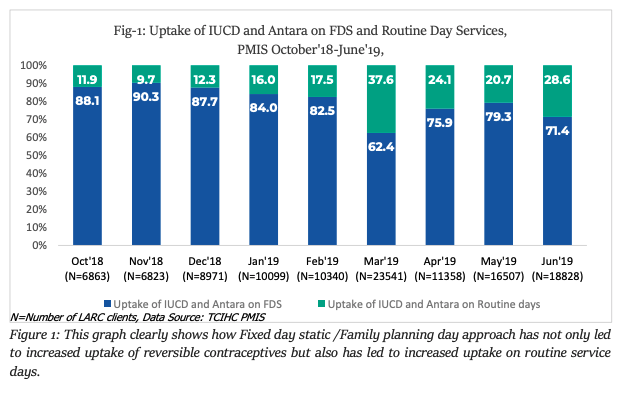
Francophone West Africa
COVID-19 had reduced access to family planning services due to a decline in the availability of services and people’s fear of infection. In Abobo, one of Abidjan’s 10 urban communes, two health districts (East and West) were able to organize special free family planning days in May and June for women of reproductive age with TCI’s support through the Union of Cities and Communes of Côte d’Ivoire (UVICOCI). Each health district organized three special family planning days from May 27-29, 2020 and June 3-5, 2020 in four health centers: Assomin Community-based Urban Health Centre, Saint Paul Maternity Hospital, Djibi Medical Clinic and Hinneh Urban Health Training.
During the three days, 626 users, including 357 new users and 269 previous users, received a modern contraceptive method, such as implants or pills (the most popular methods), IUDs or an injectable. Forty-two percent of clients were adolescents and young women age 15-24, and 58% were women age 25-49.
East Africa
- Some Tupange Pamoja-supported health facilities in Tanzania who conduct in-reaches saw a 36% increase in family planning uptake during the implementation period. (source: HMIS, February-April 2019).
- Over 300 health providers have been mentored at Tupange Pamoja implementing sites through in-reaches.
- Over 120 in-reaches have been conducted reaching about 7,640 new FP clients with contraception services, of which 4,403 (57%) were new LAPM clients (source: HMIS, July 2018-June 2019).
Nigeria
The chart below shows the uptake of family planning services for new acceptors before and during the in-reach in health facilities in Delta State. The uptake for the immediate 3-months before the in-reach were summed up to give the before data. This shows clear increase in the number of new acceptors in all facilities during in-reaches.
To learn more about the impact of in-reaches in increasing access to contraception among young people in Edo, Niger, Ogun and Plateau States, read the TCI Tales of Impact.
Evidence from the Urban Reproductive Health Initiative (URHI)
India’s experience under the Urban Health Initiative (UHI) revealed that when fixed-day services for family planning were regularly organized in a facility, the quality and utilization of routine family planning services in that facility improved. In fact, in one facility, one fixed day of providing the intrauterine device (IUD) resulted in the same number of new IUD clients that day as the entire previous quarter when IUDs were in theory provided alongside other family planning services.
The following graph shows that an increase in the number of fixed service days conducted in selected facilities across 11 cities of UHI resulted in corresponding increases in the number of acceptors of long-acting and permanent methods (LAPMs).

TCI APP USERS PLEASE NOTE
You will only receive CERTIFICATES by email – when earning a score above 80% – and will not be able to view or print a certificate PDF from the TCI app.
Test Your Knowledge
Earn a Certificate
Quiz Summary
0 of 5 Questions completed
Questions:
Information
You have already completed the quiz before. Hence you can not start it again.
Quiz is loading…
You must sign in or sign up to start the quiz.
You must first complete the following:
Results
Results
0 of 5 Questions answered correctly
Your time:
Time has elapsed
You have reached 0 of 0 point(s), (0)
Earned Point(s): 0 of 0, (0)
0 Essay(s) Pending (Possible Point(s): 0)
Categories
- Not categorized 0%
- 1
- 2
- 3
- 4
- 5
- Current
- Review
- Answered
- Correct
- Incorrect
-
Question 1 of 5
1. Question
What are some of the benefits of fixed-day service provision for family planning?
CorrectIncorrect -
Question 2 of 5
2. Question
India’s experience under the Urban Health Initiative (UHI) revealed that when fixed-day services for family planning were regularly organized in a facility, the quality and utilization of routine family planning services in that facility improved.
CorrectIncorrect -
Question 3 of 5
3. Question
In Francophone West Africa, fixed-day family planning services were often combined with other services such as breast and cervical cancer screenings, infertility care, and HIV/AIDS care, further serving the health needs of underserved populations.
CorrectIncorrect -
Question 4 of 5
4. Question
How do you intend to use the information reviewed and/or tools that you accessed?
-
This response will be awarded full points automatically, but it can be reviewed and adjusted after submission.
Grading can be reviewed and adjusted.Grading can be reviewed and adjusted. -
-
Question 5 of 5
5. Question
How useful did you find the information and/or tools presented on this page? Please write your response in the box below using one of the following phrases: Very useful, Useful, Somewhat useful, Not useful.
Feel free to comment on why you made that choice.
-
This response will be awarded full points automatically, but it can be reviewed and adjusted after submission.
Grading can be reviewed and adjusted.Grading can be reviewed and adjusted. -
Service Delivery Approaches
Helpful Tips
- Preplanning is key to the success of the service day. Make sure you have reviewed and addressed all possible complications that could happen on the day, such as the registration process and stocking all necessary supplies and equipment.
- Designating a team to organize the day or days can distribute the responsibilities and make sure nothing gets missed. In India, specific roles and responsibilities are outlined for every member of the team.
- The day can be organized to provide either a range of contraceptive methods or specific methods.
- Ensure community awareness of the day by publicizing the service schedule widely and using communication reminders like handbills and newspaper inserts or ads.
Challenges
- Make sure that demand generated can be met with the services provided.
- The cost of providing free services may be prohibitive to the program and should be planned far in advance with the appropriate authorities within the health system.
- Follow-up for women benefitting from this service may be challenging. One solution is to transfer the medical files to the woman’s facility of choice.


